Algernon Wyndham Freeman
Trooper 1682 Algernon Wyndham Freeman, 1st/1st Berkshire Yeomanry
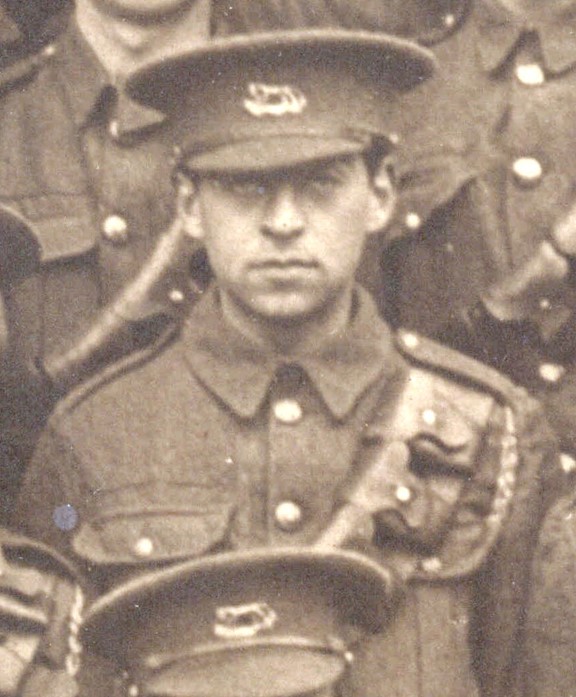
Algernon Freeman
|
Algernon was born in Newbury in 1893 the son of Charles Ernest Augustus Freeman and his wife Rosetta née Pearman. His parents were not local; his father had moved to Newbury in 1883 to set up in business as a poulterer, fishmonger and dealer in game at 30 Cheap Street (demolished to make way for the Kennet Centre). Rosetta had a separate trade as a florist from the same premises – amazingly fitting this in raising nine children. This dual-aspect business is reflected in their advertisments.
Their large family consisted of: Charles Hood Freeman (born 1883), Albert John (1884), Evelyn Rose (1885) Arthur Ernest (1886), Percy Frederick (1887), Gertrude Agnes (1889), Leslie William (1890), Algernon Wyndham (1893), Harold Geoffrey (1894), Mildred Nancy (1902). All survived childhood apart from Percy, who died on 1 January 1888 when he was less than 3 months old.
In 1906 Charles moved premises to 81 Northbrook Street, which was the start of a unsettled period as he was in business in several locations – 73 Northbrook Street (1908-09), 56 Cheap Street (1910) and 30 Northbrook Street (1911-13). Such a peripatetic existence cannot have been good for business, indeed the business changed with Charles moving from selling fish and poultry to fruit at the last premises. More confusion comes from the return he filled in for the 1911 census, where he gives his occupation as ‘soap maker (dealer)’ – the fruiterer’s shop only being hinted at through 17 year old Algernon’s occupation as ‘fruiterer’s shopman’.
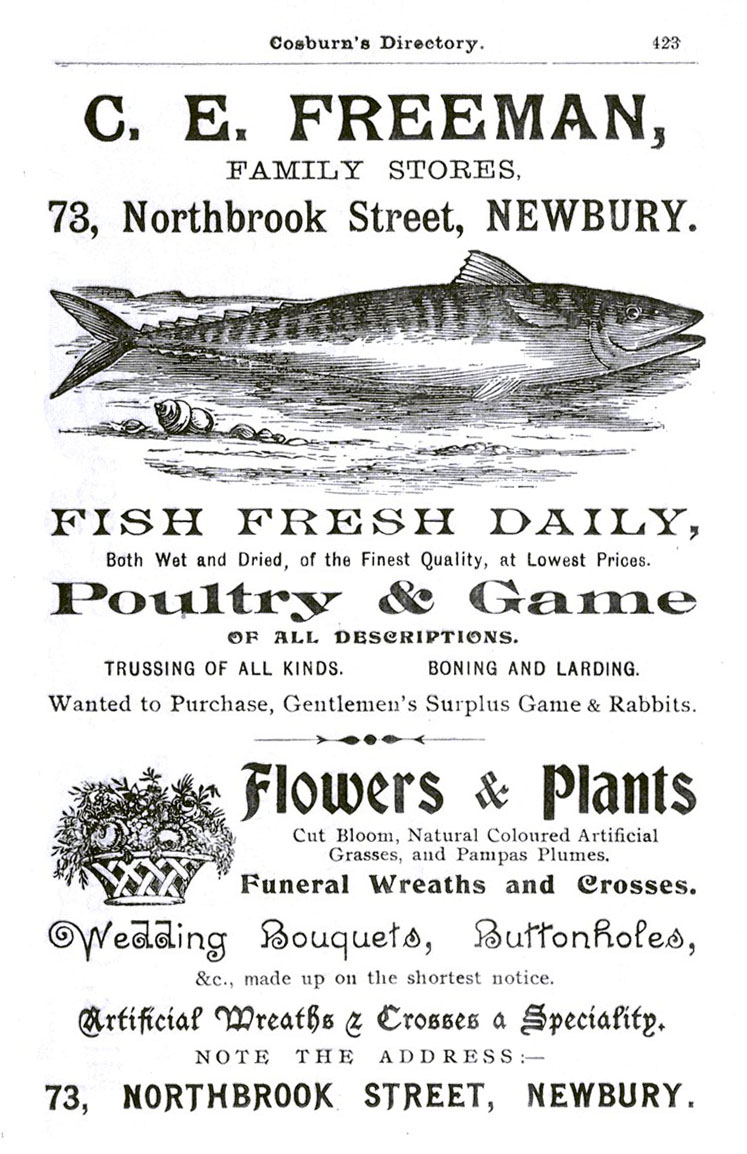
Advertisement - Cosburn's Newbury & District Directory 1908 |
After the entry in a 1913 directory the Freeman’s disappear from Newbury records, Rosetta reappearing, alone, in 1918 at South Farnborough, Hants. The obvious assumption is that Charles had died and Rosetta was then a widow, but Charles’ death was not registered in the intervening period and it appears that he was still alive in 1919 and was paid Algernon’s War Gratuity.
In 1911 Algernon and his brother Geoffrey decided to join the army, not as regular soldiers, but in the part-time Territorial Force. Nor were they about to commit to long route marches, they would be cavalrymen, troopers in the Berkshire Yeomanry. Whilst no record has been found of their enlistment their service numbers 1682 (Algernon) and 1683 (Geoffrey) were issued that year and the fact that they were given consecutive numbers shows they signed up together.
In 1914 the Yeomanry were called up and asked to volunteer for overseas service; along with around 70% of their fellows they signed the Imperial Service Agreement and began to look forward to some action. The Berkshire Yeomanry formed a part of the 2nd South Midland Mounted Brigade, alongside the Queen’s Own Oxfordshire Hussars and the Buckinghamshire Yeomanry. The Brigade assembled at Church Camp near Didcot and waited the call to France. The call soon came for the Oxfordshire Hussars who went to Belgium on 14 September intended as cavalry support for the Royal Naval Division – chosen for the task by the First Sea Lord, Winston Churchill, who (non-coincidently) was also an officer in the Oxfordshire Hussars.
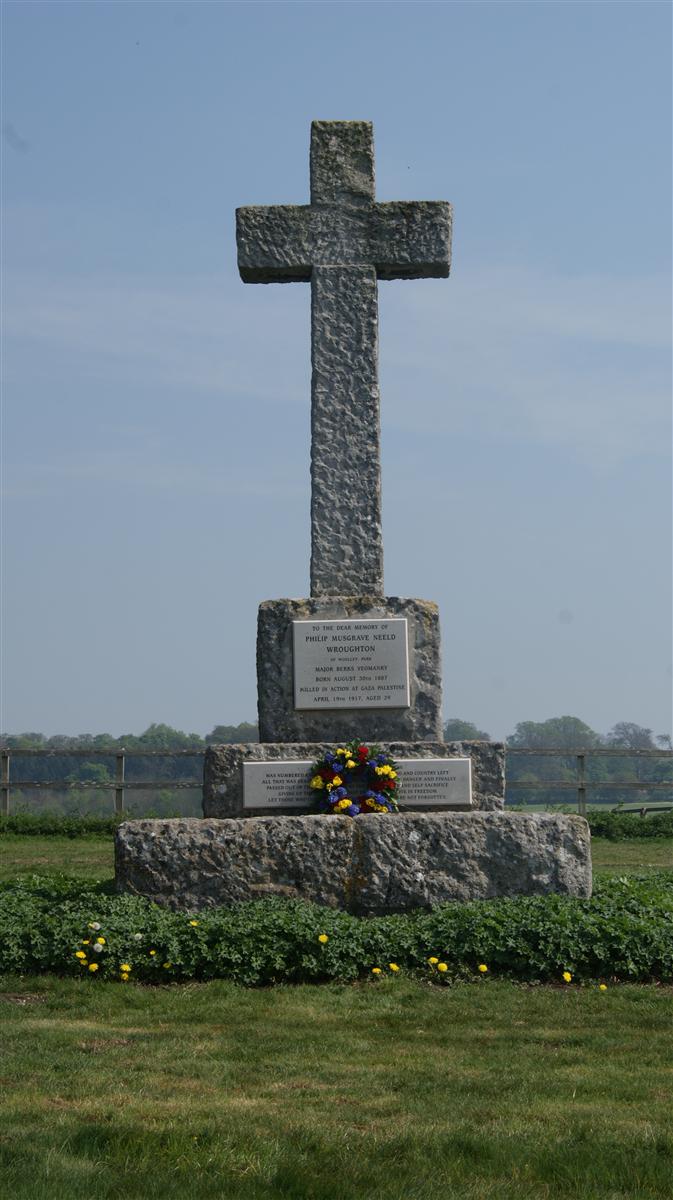 |
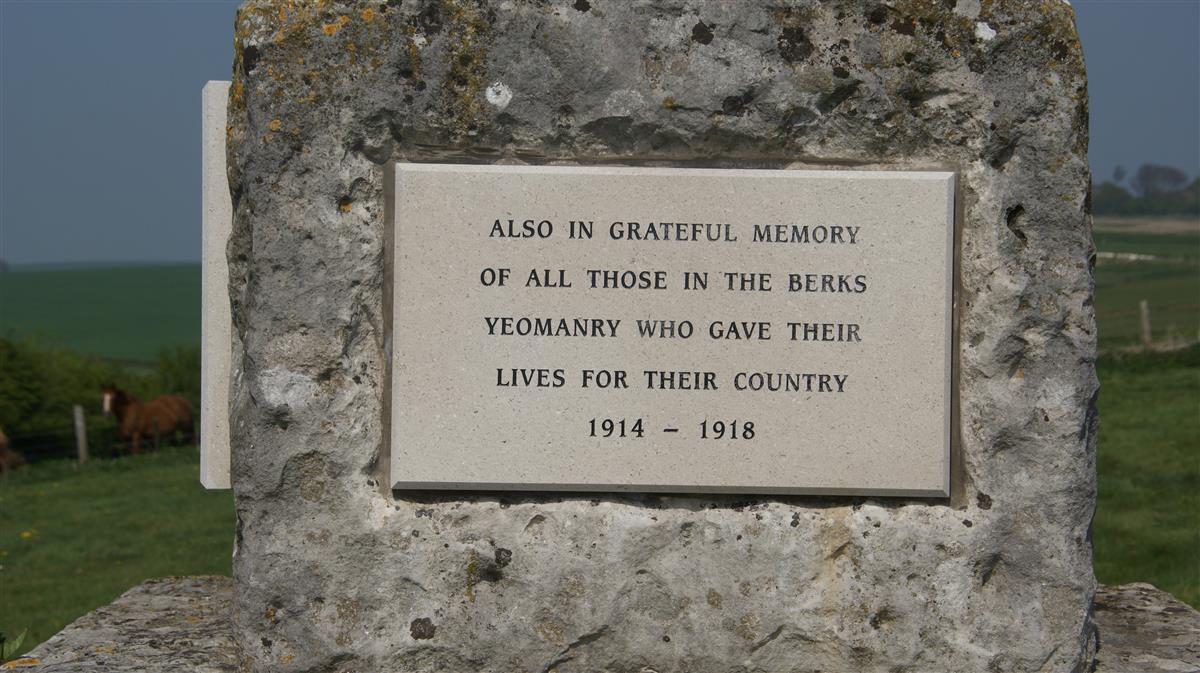
Memorial tablet to the Berkshire Yeomanry on the Wroughton Memorial on the downs at Woolley. (left) |
The rest of the brigade had to wait until 1915 for orders abroad – not to France, but to Egypt. On 14 August 1915, exactly a year after the British entry in the war, they left their horses in Egypt and boarded ships as infantry bound for Gallipoli. On 18 August they landed at Suvla Bay; three days later they took part in a gallant but futile charge at Scimitar Hill. They suffered heavy casualties, including Algernon, who was reported ‘missing in action’ - Geoffrey escaped unharmed. In the aftermath of the charge Trooper Fred Potts from Reading won a Victoria Cross for rescuing a comrade from the battlefield.
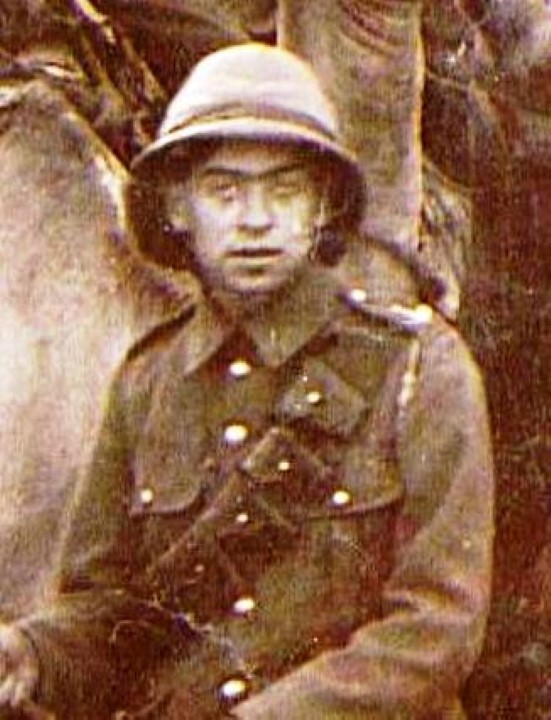
Algernon Freeman on a trip to the pyramids at Giza. |
Both brothers were mentioned in the local paper when a third brother, Leslie, was wounded in late 1915:
NWN 7 Jan 1916 p8 – Local War Notes
Corporal Leslie W Freeman, of the 1/20th London Regt, son of Mr and Mrs C E Freeman, formerly of Newbury, was wounded in the recent operations in France. Another son, Trooper Algernon Freeman of the Berks Yeomanry, was reported missing after the great charge in Gallipoli, and no further news has been received of him. It was stated at the time that he was an apprentice at Messrs Edwards and Godding’s, but this was his brother, Lce-Corpl Geoffrey Freeman, also of the Berks Yeomanry, who was in the same engagement, and among the fortunate survivors.
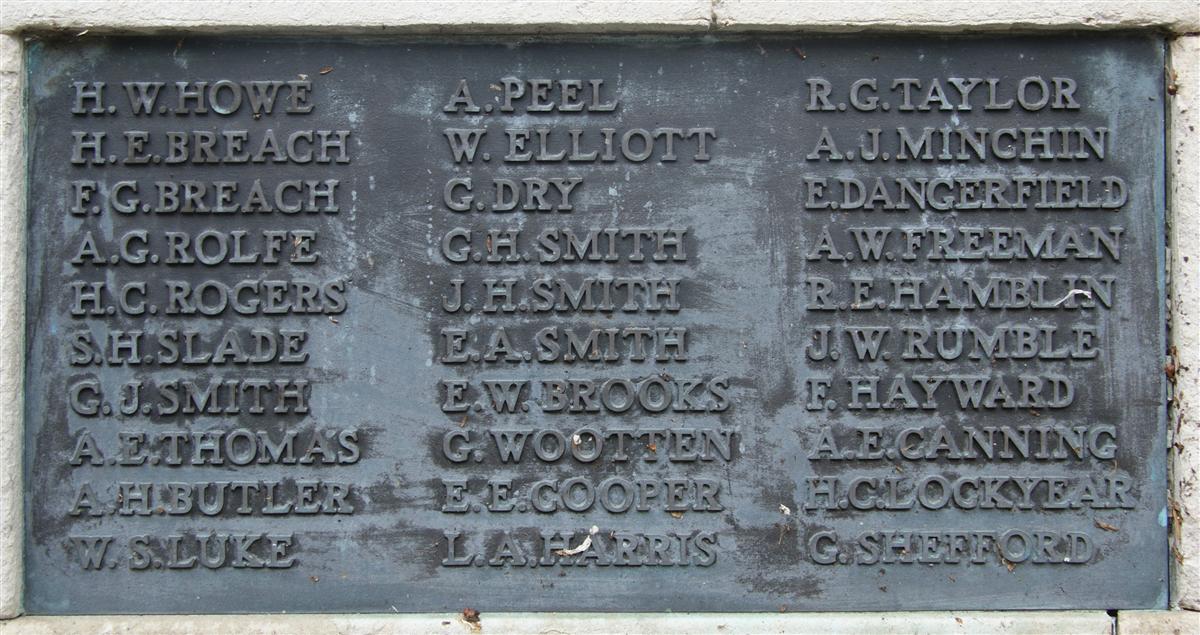
Algernon's name on Newbury War Memorial. (right) |
Algernon’s body was never identified so his name is remembered on the Helles Memorial.
Locally he is remembered on the Newbury Town War Memorial, the memorial board and roll of honour in St Nicolas’ Church and on his baby brother, Percy’s, grave in Newtown Road Cemetery.
Nothing is known of the war service of Algernon’s brotherand Arthur:
he was of an age to be conscripted, but his names is common enough to be lost in the records of multiple Arthur Freemans. The remaining brothers can be accounted for: Percy who died in infancy and Charles were both dead before the war started;
Albert served in the RFC & RAF, Leslie in the 1/20th London Regiment and Geoffrey was alongside Algernon at Chocolate Hill.
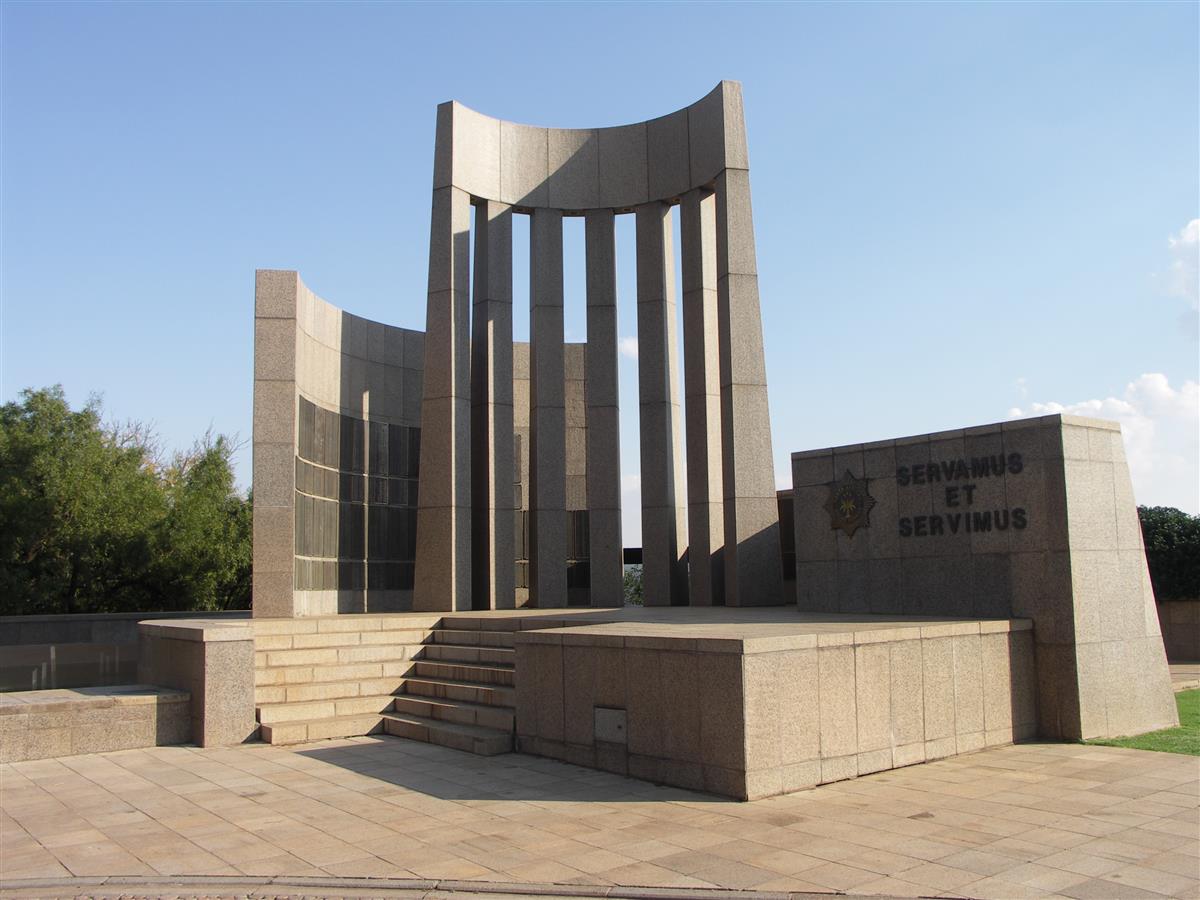
South African Police Memorial by NJR ZA - Own work. Licensed under CC BY-SA 3.0 via Wikimedia Commons |
Albert John Freeman enlisted into the Royal
Flying Corps on 13 October 1916 as a Air Mechanic. He did not go abroad
until June 1918 when he went to France where he was posted to 4 Squadron. It
is possible that he was destined for France regardless, but the date falls
in the period when the Allies were fighting desperately
against the powerful German Spring Offensive known as the Kaiserslacht
when heavy losses meant a surge of reinforcements from the UK. Albert
survived the war and was discharged from the RAF in 1919. He returned to
work for his pre-war employer, the Post Office and, in 1921 was working as a
porter at the Mount Pleasant Sorting Office in London.
Harold Geoffrey Freeman (Geoffrey) joined up alongside Algernon and served alongside him at Chocolate Hill. He went on to rise through the Yeomanry ranks to Sergeant spending a period attached to the Camel Corps. In 1917 he transferred to the Royal Flying Corps and became a fighter pilot flying, among others Spads and SE5s. He transferred as a Flying Officer into the newly formed Royal Air Force and was discharged (transferred to the unemployed list) in March 1919. As he had moved to Hungerford he is remembered (as an RAF ‘Pte’, perhaps a misreading of pilot?) on the roll of honour in Hungerford Town Hall
Leslie William Freeman joined up very soon after war was declared, like his brothers he opted for a Territorial unit, in his case an infantry unit – the 20th (County of London) Battalion, The London Regiment (Blackheath and Woolwich); he was living in Sydenham at the time. Like his brothers he signed the Imperial Service Agreement and was sent to a theatre of war in 1915. In his case he went to France/Flanders landing in France on 9 March 1915. As the newspaper article above notes he was wounded, which resulted in a return to England for treatment – for almost a year (4 October 1915 to 29 September 1916). Back in France he had risen to the rank of Acting Sergeant before, on 23 January 1917 he left the London Regiment to take a commission in the 5th Battalion, Middlesex Regiment. This was a Reserve/Training battalion; once he had been through the officer training process he was posted to the 20th (Service) Battalion, Middlesex Regiment in the field. On 9 April 1918 he was taken prisoner during the German Spring Offensive and spent the rest of the war as a POW. He was repatriated on 8 December 1918. He served again in the Second World War.
